Hi from Paris,
The European Union’s strength lies in its economic weight. Its great weakness lies in diplomacy. And yet the Union is reaching a point in its history where war is raging on its borders and the East-West, Moscow-Washington divide is once again becoming an inescapable part of politics.
To survive, the EU must become geopolitical. Enlargement is the key to its success. The EU must open up to Ukraine, which is fighting for its freedom, and to Moldova, which is struggling against Russian influence, as well as to the Western Balkans, which have been hoping to join the club for so long.
Sceptics, especially in Paris, will reply that previous EU enlargements have sometimes left Europe ungovernable, and that it is difficult to imagine a functional Union of 36, when it is already so often divided at 27. Over the last few years, Emmanuel Macron has promoted a “multi-speed Europe” rather than genuine enlargement.
It is true that the EU will not be able to function as it does today. But adding new members offers the bloc a chance to reinvent and reform itself, as it has done in the past.
Nelly Didelot, this week’s Editor-in-Chief
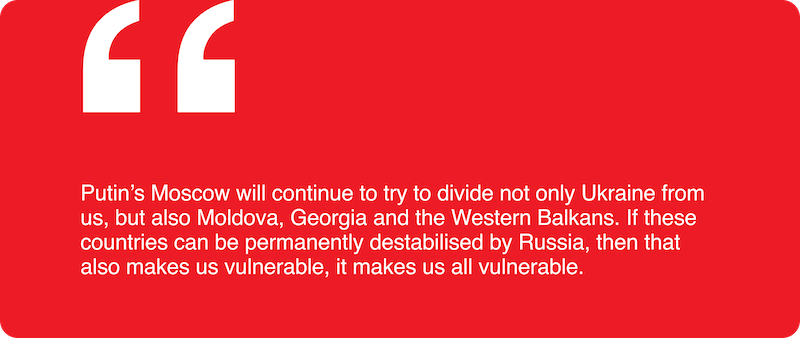
The German Foreign Minister, Annalena Baerbock is a passionate advocate of EU enlargement. Yet, it remains unclear if Germany will consent to the swift accession of Ukraine and other candidate states. There is a major worry that the EU will repeat previous mistakes concerning corruption and the rule of law.
To avoid this, Baerbock has reiterated the necessary steps to reform the Union, such as removing the unanimity principle in decision-making. But this suggestion is also controversial, even inside the coalition leading Germany, such as with the liberal FDP. The party objects to Germany losing its power of veto when it comes to financial and taxation issues.
Furthermore, support for Ukraine’s rapid accession to the EU is decreasing among the German population. In May 2022, 63% were in favour, but by June 2023 this dropped to only 45%, with 42% showing strong dissent.
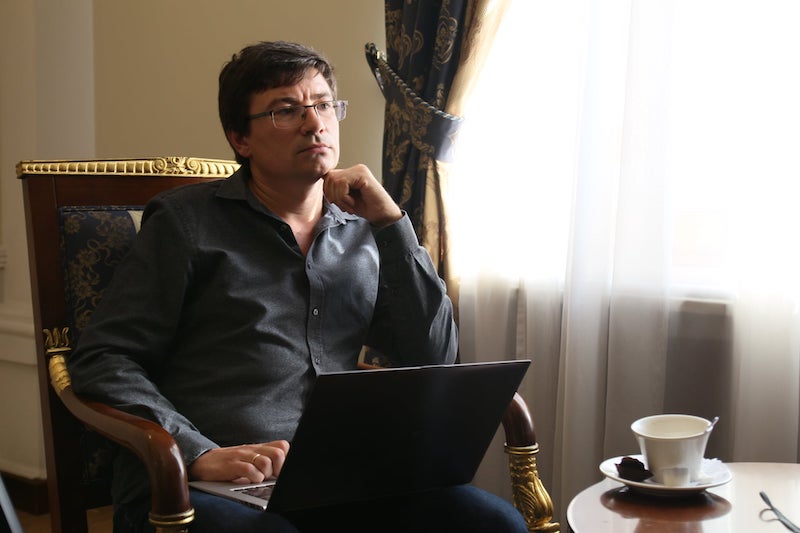
Most of the work regarding Ukraine’s accession to the EU is still to be done, reveals one of Ukraine’s leading European integration experts, European Pravda editor-in-chief Sergiy Sydorenko.
The European Commission has acknowledged Ukraine’s accomplishments in reforming since the summer of 2022. But were these substantial reforms, or mostly bureaucratic?
I strongly oppose the narrative that there is a difference between “true” and “paper-based” reforms. Most reforms are actually done in the spheres of legislative acts, and procedural changes, among others. In terms of reforms which can transform the country, often there is no element that is really tangible [to the people at large].
If you take into account the situation in Ukraine, in a year’s time a lot has been done. Even EU bureaucrats who aren’t supportive of Ukraine have acknowledged this. But if we really want to join the EU, we are still doing too little too slowly. The amount of work to be done is about ten times larger than for us to become an associate member of the EU.
Which key challenges do you see?
If you are waiting for the words “anti-corruption” from me, I won’t say them. I think there will be harder challenges, but we can’t even imagine them now. For example, environmental reforms are usually really hard to implement. But maybe in Ukraine things will happen differently.
Ukrainian politicians say it’s possible to end the EU accession talks in about two years. Is there any other country which has done such a large amount of work this fast?
I don’t think two years and even four years are realistic. But comparing Ukraine to other countries is a trap: The EU has changed since its most recent substantial enlargement. It’s more loyal and faster in some things, such as accepting new members which are in its security interests. This is the situation now, though. If in France, for example, Marine Le Pen will become President instead of Emmanuel Macron, the story will change.
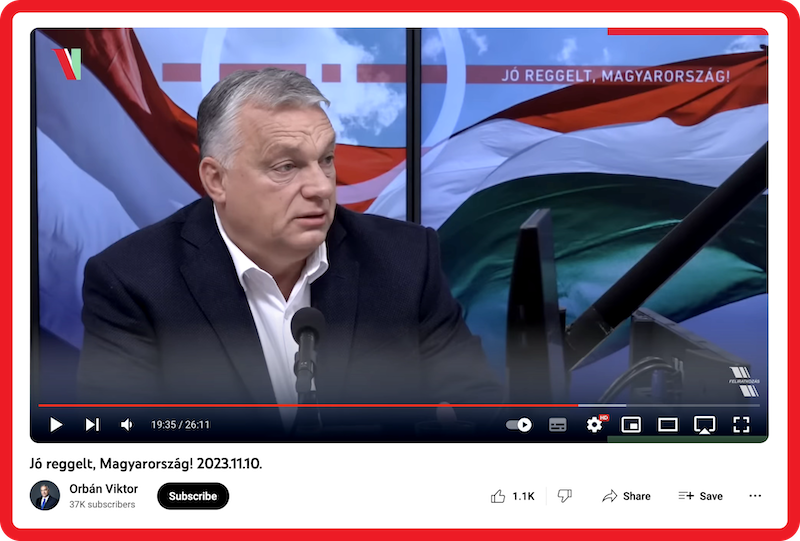
“Ukraine is as far from EU membership as Makó is from Jerusalem,” Hungarian PM Viktor Orbán stated jokingly in the Hungarian state media, a day after the European Commission gave the green light to the wartorn state’s accession negotiations.
The old proverb quoted by the Prime Minister refers to Makó, a remote, rural town in Hungary, and is, therefore, a measure of large distance.
Would Ukraine be a more faraway country for the Orbán cabinet than Moldova? The Hungarian government seems to have no serious concerns about Moldova’s EU accession. Hungarian foreign minister Péter Szijjártó visited Romania ahead of these negotiations, where he discussed energy cooperation with his Romanian counterparts and raised no objections to Moldova’s accession, which is important for Romania. But with Ukraine, Szijjártó says “war would come to the EU”.
Above all, warned MEP Kinga Gál from Orbán’s Fidesz party, “the EU must first fulfil its promises to the Western Balkans, including Serbia [a close ally of Budapest].”
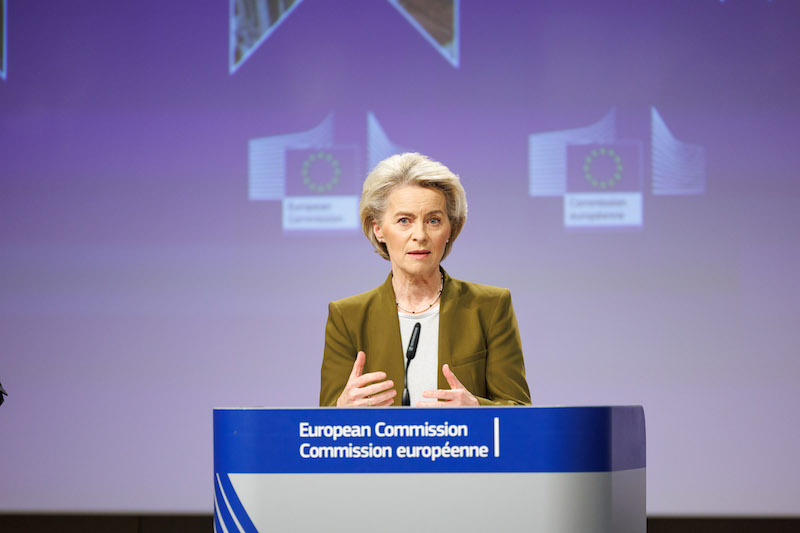
Two decades ago in Thessaloniki, the EU promised the Western Balkans full membership in the political bloc. Fast-forward to today, and it seems nothing has moved on.
Sure, last week Brussels uttered a conditional ‘Yes’ for Bosnia’s start of accession talks, while demanding more reform, and slapped the other five states on the back for their commitment to the accession process.
The EU also launched its new Growth Plan for the Western Balkans with an aim to double the size of the economies of the six countries, bring their markets closer, and has pledged six billion euros for reforms.
No one in the Western Balkans was excited. Here lies the catch. The EU has simply lost the hearts and minds of the region’s people.
Bosnia remains stuck in an inter-ethnic and legal nightmare, Serbia and Kosovo feel they should cut off one of their arms and legs to progress, North Macedonia remains de facto blocked by EU member Bulgaria over sensitive identity issues, Albania is forced to wait for North Macedonia, and Montenegro has fallen victim to domestic political deadlock.
People have already subscribed to the well-conceived anti-EU narratives. I hear many say “Brussels is hypocritical” and “The EU is on the brink of falling apart.”
The EU needs to decide. Either they muster the courage to export stability to the region, and reap the long-term benefits of a greater union, or the region slips into disarray, and they must brace for importing instability.
Brussels will need to show strategic forward-thinking, a vision. In the same way it did during its enlargement with eastern European countries in the 2000s. Or let’s stop sugarcoating the bloc’s lack of will or capability. In that case the EU will be thrown out on its own doorstep, and we will become the site of a shipwreck, where the EU values went to die.
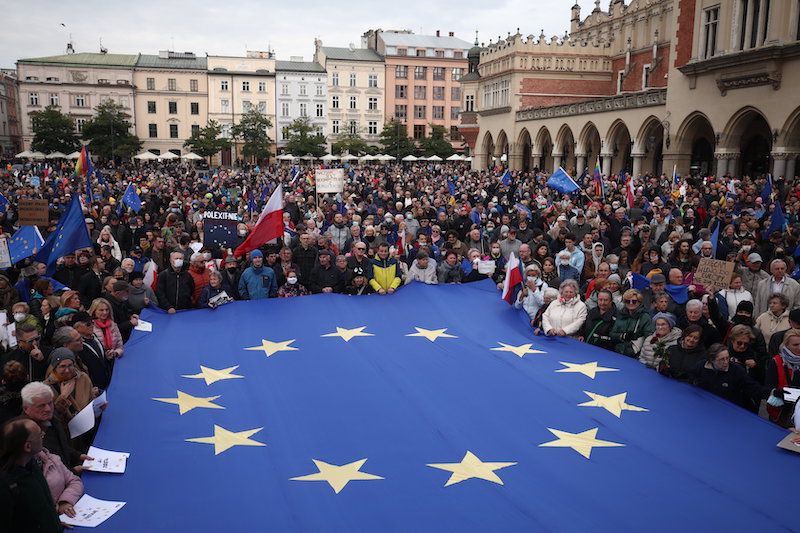
Twenty years ago, no one would have bet that Poland’s accession to the European Union would be a great success for the country and Europe. The dominant fears were that Poland needed more reforms, had a weak economy and high unemployment, so its people would flood the Western countries’ labour market.
Poland joined the EU on credit. Successive governments implemented the required reforms. Poles did indeed travel en masse to work in EU countries, but the Polish plumber became the symbol of a hard-working, reliable craftsman.
Since Poland’s accession to the EU was a success, it was thought this would be the case for other countries. In 2007, Romania and Bulgaria joined the EU. This is where serious problems began, as these countries, plagued by various political conflicts, failed to carry out the necessary systemic reforms.
Soon the economic and migration crises began to reach Europe, serious enlargement was postponed for an unspecified period. On top of that, it turned out that Poland – a recent front-runner in Europe – started to cause big problems. Those in power since 2015 started to demolish the rule of law, one of the main pillars on which the EU community is founded.
Moreover, it turned out that there is no effective way to discipline Poland, because the EU has no tools to do so.
The Union is once again at a crossroads: accepting new countries or reforming to prevent it from breaking up? The example of the Polish experience shows that both are necessary. Without enlargement and the will to admit more countries, the EU loses its credibility. But it must have the tools to discipline countries that break its rules.
Thanks for reading the 52nd edition of European Focus,
I hope that this week’s newsletter has been interesting for you, who are reading us from inside and outside the current borders of the EU. The next step for enlargement will be next month, during the European Council. The debates between leaders should echo issues we have raised here.
As always, we are interested in your feedback. You can write us an email to info@europeanfocus.eu.
See you next Wednesday!
Nelly Didelot, this week’s Editor-in-Chief







